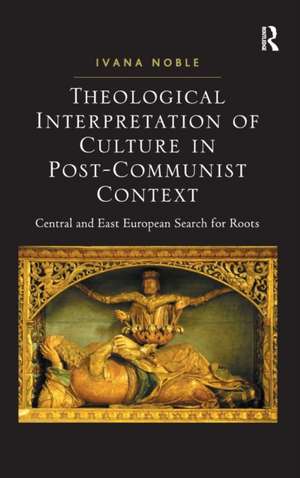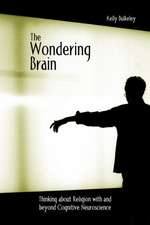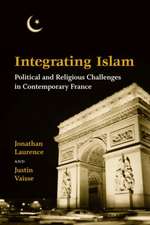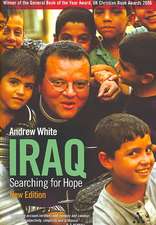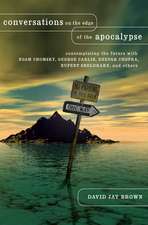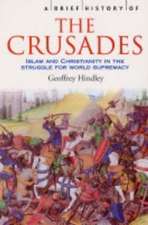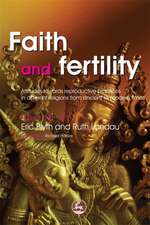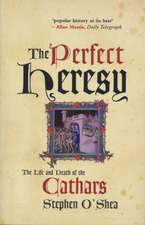Theological Interpretation of Culture in Post-Communist Context: Central and East European Search for Roots
Autor Ivana Nobleen Limba Engleză Hardback – 28 apr 2011
| Toate formatele și edițiile | Preț | Express |
|---|---|---|
| Paperback (1) | 385.08 lei 6-8 săpt. | |
| Taylor & Francis – 30 sep 2021 | 385.08 lei 6-8 săpt. | |
| Hardback (1) | 1054.71 lei 6-8 săpt. | |
| Taylor & Francis – 28 apr 2011 | 1054.71 lei 6-8 săpt. |
Preț: 1054.71 lei
Preț vechi: 1286.24 lei
-18% Nou
Puncte Express: 1582
Preț estimativ în valută:
201.81€ • 210.71$ • 167.03£
201.81€ • 210.71$ • 167.03£
Carte tipărită la comandă
Livrare economică 04-18 aprilie
Preluare comenzi: 021 569.72.76
Specificații
ISBN-13: 9781409400073
ISBN-10: 1409400077
Pagini: 242
Dimensiuni: 156 x 234 x 14 mm
Greutate: 0.45 kg
Ediția:1
Editura: Taylor & Francis
Colecția Routledge
Locul publicării:Oxford, United Kingdom
ISBN-10: 1409400077
Pagini: 242
Dimensiuni: 156 x 234 x 14 mm
Greutate: 0.45 kg
Ediția:1
Editura: Taylor & Francis
Colecția Routledge
Locul publicării:Oxford, United Kingdom
Cuprins
Contents: Preface; Introduction: culture as a theological theme; Part I The World: Images of the world in Karel Capek and Isaac Bashevis Singer; Theologies of the world. Part II Memory: Heritage of totaltarian cultures in folk music; Redemptive memory on theology. Part III The Ultimate Fulfilment: Figuring the ultimate fulfilment in Central European cinema; Love as the ultimate fulfilment in theology; Conclusion; Bibliography; Index.
Notă biografică
Ivana Noble (DolejÅ¡ová) is a Czech theologian, a graduate of the Hussite Theological Faculty in Prague, where she finished her Masters degree just after the fall of Communism. She completed her doctoral studies at Heythrop College in London with a thesis Account of Hope: A Problem of Method in Postmodern Apologia (published in 2001). In 1994-2000 she was Director of the Institute of Ecumenical Studies in Prague, which she co-founded. During that time she wrote also her habilitation work, published in Czech as Po BozÃch stopách: Teologie jako interpretace nábozenské zkuÅ¡enosti (in 2004), which has now been published in English under the title Tracking God: Ecumenical Fundamental Theology (2010). She is a former president of Societas Oecumenica, the European association for ecumenical theology and author of numerous articles on the hermeneutics of Christian tradition, the dialogue between philosophy, theology and arts, as well as on theological responses to totalitarian thinking and the secularization - post-secularization debate. Currently she works as an associate professor of Ecumenical Theology at the Protestant Theological Faculty of Charles University and is also a Senior Research Fellow at the International Baptist Seminary in Prague, Czech Republic.
Recenzii
Selected winner of The Competition of High Quality Monographs of Charles University, Prague, 2012. 'Ivana Noble has written a sensitive and powerful book, courageous in its honest pathos for humanity and inspiring with its humble confidence. In these pages the soul of Central-Eastern Europe comes to life as this talented theologian graces us with knowledge of how religious symbols and meaning cultivate the human search for meaning under the ambivalent surfaces of life, in once aggressive but now post-secular societies. Noble offers us in the West an encounter with the Other that cannot but give much food for thought about religion in our own increasingly post-institutional religious situations. Original not only in content but also methodology, her text promises numerous insights for political theology, liturgical studies, theological aesthetics, indeed, for all seeking to construct theologies at once fundamental and practical in this postmodern age.' Bruce T. Morrill, SJ, Boston College, USA ’How much do you know about Czech theology? If someone asked me this question I would have to confess that the answer is 'almost nothing'. There are several good reasons for reading Ivana Noble's book ...but one of them surely is that it makes me realise that what usually goes under the name of European theology most often is something less than that. ... Noble herself belongs to a post-Communist generation of theologians (and philosophers) that are beginning to be heard by a wider theological audience to the benefit of a somewhat myopic 'European' theological debate....This is good theology of culture, period. ...I started reading this book to get to know more about post-Communist culture, I ended up deepening my grasp of theology's mission as well.’ Journal of Reformed Theology 'Noble's project is both fascinating and challenging in endeavouring to describe things which are meant to be seen, listened to, or read. In some way, Theological Interpretation is a guide and
Descriere
Twenty years after the fall of communism in Central and East Europe is an ocassion to reevaluate the cultural and theological contribution from that region to the secularisation - post-secularisation debate. Czech theologian Ivana Noble develops a Trinitarian theology through a close dialogue with literature, music and film, which formed not only alternatives to totalitarian ideologies, but also followed the loss and reappeareance of belief in God. Noble explains that, by listening to the artists, the churches and theologians can deal with questions about the nature of the world, memory and ultimate fulfilment in a more nuanced way. Then, as partakers in the search undertaken by their secular and post-secular contemporaries, theologians can penetrate a new depth of meaning, sending out shoots from the stump of Christian symbolism. Drawing on the rich cultures of Central and East Europe and both Western and Eastern theological traditions, this book presents a theological reading of contemporary culture which is important not just for post-Communist countries but for all who are engaged in the debate on the boundaries between theology, politics and arts.
